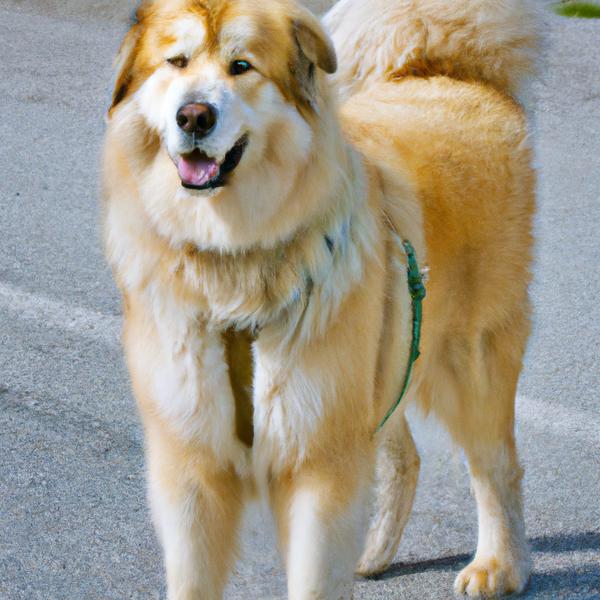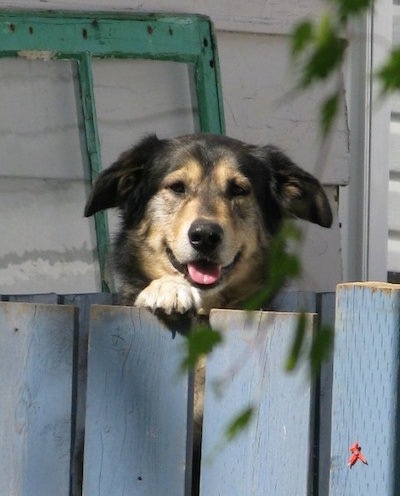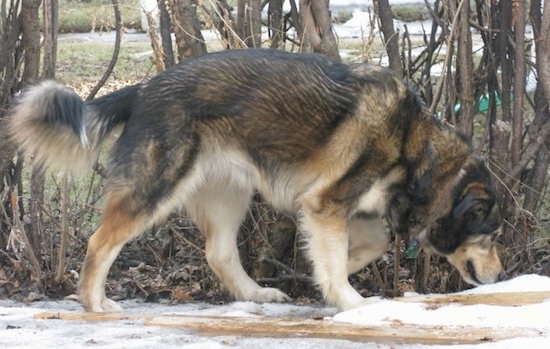Alaskan Goldenmute

Breed Information
Is Alaskan Goldenmute a purebred?
Cross Breed
What were Alaskan Goldenmutes originally used for?
Companionship, Sporting
How Long Do Alaskan Goldenmutes Live? What is average life expectancy for an Alaskan Goldenmute? How long can Alaskan Goldenmutes live?
11-15 years
The average Alaskan Goldenmute lifespan is somewhere between 11-15 years, provided they aren't beset by any exceptional health issues or injuries.
Alaskan Goldenmute Height & Weight
How big is a full grown Alaskan Goldenmute?

| Height | ||||
|---|---|---|---|---|
| Average | 6 months | 12 months | 18 months | |
| Male | 23-25 inches (58.4 - 63.5 cm) | 14.5 inches (36.8 cm) | 19.5 inches (49.5 cm) | 24.0 inches (61 cm) |
| Female | 22-24 inches (55.9 - 61 cm) | 11.0 inches (27.9 cm) | 17.5 inches (44.5 cm) | 23.0 inches (58.4 cm) |
| Weight | ||||
|---|---|---|---|---|
| Average | 6 months | 12 months | 18 months | |
| Male | 65-85 pounds (29 - 39 kg) | 27.5 pounds (12 kg) | 56.5 pounds (26 kg) | 72.5 pounds (33 kg) |
| Female | 60-75 pounds (27 - 34 kg) | 22.5 pounds (10 kg) | 50.0 pounds (23 kg) | 67.5 pounds (31 kg) |
Are Alaskan Goldenmutes Hypoallergenic?
No
Unfortunately, the Alaskan Goldenmute is not hypoallergenic, making it not a good choice for a dog lover who suffers from pet allergies.
What is an Alaskan Goldenmute personality? What are Alaskan Goldenmute dogs best known for?
Playful
Dignified
Intelligent
Confident
Friendly
Affectionate
Reliable
Loyal
Devoted
Kind
Trustworthy
Are Alaskan Goldenmutes heavy shedders? How Much Does an Alaskan Goldenmute Shed?
![]()
![]()
![]()
![]()
![]()
Alaskan Goldenmute dogs are heavy shedders, they will lose a significant amount of hair each year. To decrease the amount of shedding, you can regularly brush your Alaskan Goldenmute. This will remove loose hair and keep his coat growing in the same direction.
Breed History
Where do Alaskan Goldenmutes come from?
United States
What are Alaskan Goldenmutes descended from?
Golden Retriever, Alaskan Malamute
What organizations or kennel clubs recognize/register the Alaskan Goldenmute breed?
Dog Registry of America Inc.
When were Alaskan Goldenmutes first bred? How old is the Alaskan Goldenmute breed?
Mid 1900s

Alaskan Goldenmute Appearance
What color are Alaskan Goldenmute eyes?
Blue
Hazel
Brown
What color can Alaskan Goldenmute nose be naturally?
Black
Brown
What color can Alaskan Goldenmute coat be naturally?
Fawn
Cream
White
Sable
Silver
Blue
Red
How long is an Alaskan Goldenmutes coat?
![]()
![]()
![]()
![]()
![]()
The coat of an Alaskan Goldenmute falls in the medium length category.
How Dense Is The Alaskan Goldenmute Coat?
![]()
![]()
![]()
![]()
![]()
What is the texture of the hair of an Alaskan Goldenmute?
Straight
How many puppies can an Alaskan Goldenmute have in a litter? How many puppies can an Alaskan Goldenmute have in her first litter?
4-10 puppies per pregnancy
An Alaskan Goldenmute can have a litter of 4-10 puppies on average. However, it's worth noting that the size of the litters can vary greatly. Factors that can influence litter size include the health of the mother, breeding history, and genetics.
![]()
![]()
![]()
![]()
![]()
The adaptability of Alaskan Goldenmute dogs is a well-known trait, they are known for being able to adjust well to different living environments and lifestyle changes.

Alaskan Goldenmute Health Issues
Do Alaskan Goldenmutes have a lot of health problems?
![]()
![]()
![]()
![]()
![]()
The Alaskan Goldenmute breed is commonly healthy with low vet costs, regular check-ups may not be as necessary but it's important to keep an eye on their health and have them checked by a veterinarian when needed.
What are the major health concerns to be aware of when owning an Alaskan Goldenmute?
Cataracts
Hip And Elbow Dysplasia
Chondrodysplasia (Chd)
What are the less significant issues to keep in mind when it comes to Alaskan Goldenmutes?
Entropion
Trichiasis
Cardiomyopathy
Glaucoma
Allergies
Skin Problems
Pyotraumaticdermatitis
Subvalvular Aortic Stenosis
Diabetes
Von Willebrand's Disease
Osteochondritis Dissecans
Bleeding Disorder
What are the occasional tests recommended for Alaskan Goldenmute breed?
Cardiac
Eye
Hip
Elbow
Dna For Vwd
Chd Clear Rating
Internal Imaging (x-ray, CT scan, MRI, etc.)
Full Body Physical Examination

Alaskan Goldenmute Needs and Activities
Do Alaskan Goldenmutes need socialization? How social are Alaskan Goldenmutes?
![]()
![]()
![]()
![]()
![]()
Alaskan Goldenmute have very high social needs. These needs include regular mental and physical stimulation, a job or purpose, and companionship. They thrive in environments where they have a lot of interaction with humans and other dogs.
How much sleep should an Alaskan Goldenmute have? Do Alaskan Goldenmutes sleep a lot?
![]()
![]()
![]()
![]()
![]()
Alaskan Goldenmutes are active dogs that don't require as much sleep as other breeds. However, they still need enough sleep to stay healthy.
Are Alaskan Goldenmutes mouthy?
![]()
![]()
![]()
![]()
![]()
What is the likelihood of an Alaskan Goldenmute running away? Do they have a tendency to explore or wander frequently?
![]()
![]()
![]()
![]()
![]()
Do Alaskan Goldenmute dogs have a high prey drive?
![]()
![]()
![]()
![]()
![]()
What do Alaskan Goldenmutes enjoy doing? How do I keep my Alaskan Goldenmute busy?
Hiking, Learning tricks, Fetch, Run, Catch, Walks, Ball, Playing, Running, Eating Snacks, Swim, Walk
What is the energy level of an Alaskan Goldenmute? How much energy does an Alaskan Goldenmute have?
High
Alaskan Goldenmutes are high-energy dogs. They need mental as well as physical exercise. These dogs require a lot of your involvement and without it they can, and will, become problematic dogs.
![]()
![]()
![]()
![]()
![]()
How far should an Alaskan Goldenmute walk each week? How many miles should an Alaskan Goldenmute walk every week?
14 miles / week
There's really no limit to how far you walk your dog as long as they're comfortable. For Alaskan Goldenmute, it's at least 14 miles / week. Just remember to build distance and stamina gradually over time.
How much an Alaskan Goldenmute should exercise a day? How much activity does an Alaskan Goldenmute need?
60 minutes
In general most Alaskan Goldenmutes usually need at least 60 minutes of exercise daily. This can be spread across the day and include all sorts of high-energy activities, like walking, running and playing.
What level of grooming should be provided for an Alaskan Goldenmute?
![]()
![]()
![]()
![]()
![]()
The Alaskan Goldenmute is a breed of dog that requires an average amount of grooming effort.
How often should you brush an Alaskan Goldenmute?
Daily
Ideally, Alaskan Goldenmute should be brushed at least 2 or 3 times a week (preferably daily) improve shedding.
What are the most commonly used brushing tools for Alaskan Goldenmutes?
Pin Brush
Dematter
Comb
Deshedder
Costs
How many cups of food does an Alaskan Goldenmute eat?
2.5 cups
For an average 65-85 pound (29 - 39 kg) Alaskan Goldenmute feed 2.5 cups daily. But, keep in mind, the amount you feed is going to be dependent on the quality of the food you are feeding.
How Much Does an Alaskan Goldenmute Cost Daily?
$2.10 - $2.70 / day
The average cost of an Alaskan Goldenmute is somewhere $2.10 - $2.70 per day.
How Much Does an Alaskan Goldenmute Cost Per Month?
$55 - $73 / month
The average per month expenses of an Alaskan Goldenmute is between $55 - $73. This makes an average of $660 - $876 per year. It will be on the higher side when the dog is still small because it will need more frequent visits to the vet, shots.
Alaskan Goldenmute Characteristic
How sensitive is an Alaskan Goldenmute dog?
![]()
![]()
![]()
![]()
![]()
This dog breed is more sensitive than others and easily overwhelmed by new surroundings and people. They need gentle handling and a calm, stable home environment with positive reinforcement training.
Do Alaskan Goldenmute do well in apartments? Are Alaskan Goldenmutes good indoor dogs?
![]()
![]()
![]()
![]()
![]()
It's not recommended to keep the Alaskan Goldenmute in an apartment, but this breed make good apartment dogs as long as they get to spend a good amount of time outside of the apartment. Alaskan Goldenmutes living in apartments will need plenty of physical exercise and stimulation throughout the day to remain happy and well-behaved.
Are Alaskan Goldenmutes good with kids? Are Alaskan Goldenmutes good around children?
![]()
![]()
![]()
![]()
![]()
A Alaskan Goldenmutes typical characteristics indicate that this breed of dog is an ideal companion for kids and makes them family pets. Their gentle and protective nature and calm mentality make them gel along quickly with the younger humans
Are Alaskan Goldenmutes good for elderly?
![]()
![]()
![]()
![]()
![]()
Are Alaskan Goldenmutes good with cats? How friendly Alaskan Goldenmutes are toward cats?
![]()
![]()
![]()
![]()
![]()
Alaskan Goldenmutes are an average cat friendly dog. They do well with cats, even more if raised together from puppyhood,
Do Alaskan Goldenmute dogs get along with other dogs? Are Alaskan Goldenmutes OK with other dogs?
![]()
![]()
![]()
![]()
![]()
Alaskan Goldenmutes are very friendly towards other dogs. This breed typically have a happy and affectionate temperament around dogs.
How do Alaskan Goldenmute dogs interact with other pets? Are they considered pet-friendly?
![]()
![]()
![]()
![]()
![]()
Are Alaskan Goldenmutes friendly with strangers?
![]()
![]()
![]()
![]()
![]()
Alaskan Goldenmutes are very friendly around strangers.
Do Alaskan Goldenmutes like to play? Are Alaskan Goldenmutes playful?
![]()
![]()
![]()
![]()
![]()
Alaskan Goldenmutes are known to be highly playful dog. So if you're not up for all that, think about adopting a slightly older Alaskan Goldenmute for a mellower experience.
Are Alaskan Goldenmute easily trained?
![]()
![]()
![]()
![]()
![]()
Alaskan Goldenmute dogs are known for their ease of training and ability to learn quickly, making them a popular choice for pet owners and trainers alike.
Compare Alaskan Goldenmute with other dogs
- Alaskan Goldenmute vs Boston Terrier
- Alaskan Goldenmute vs Malchi
- Alaskan Goldenmute vs Jafox
- Alaskan Goldenmute vs Doubull-Mastiff
- Alaskan Goldenmute vs Belgian Sheepdog
- Alaskan Goldenmute vs Lapponian Herder
- Alaskan Goldenmute vs Shiba Corgi
- Alaskan Goldenmute vs Welshund
- Alaskan Goldenmute vs Scottish Deerhound
- Alaskan Goldenmute vs Faux Frenchbo Bulldog